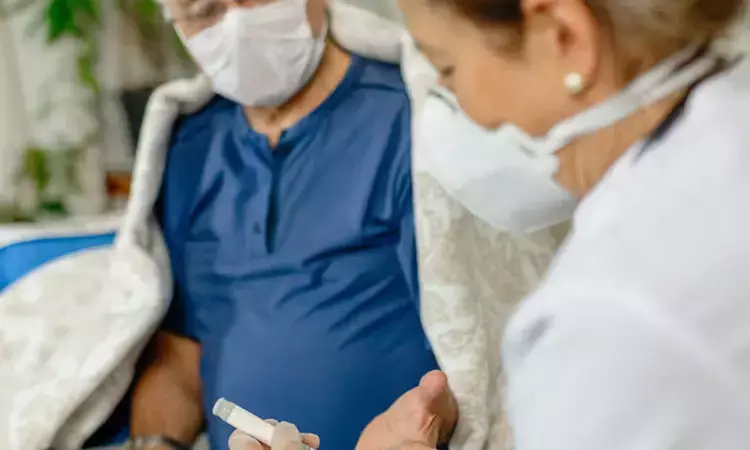- Home
- Medical news & Guidelines
- Anesthesiology
- Cardiology and CTVS
- Critical Care
- Dentistry
- Dermatology
- Diabetes and Endocrinology
- ENT
- Gastroenterology
- Medicine
- Nephrology
- Neurology
- Obstretics-Gynaecology
- Oncology
- Ophthalmology
- Orthopaedics
- Pediatrics-Neonatology
- Psychiatry
- Pulmonology
- Radiology
- Surgery
- Urology
- Laboratory Medicine
- Diet
- Nursing
- Paramedical
- Physiotherapy
- Health news
- Fact Check
- Bone Health Fact Check
- Brain Health Fact Check
- Cancer Related Fact Check
- Child Care Fact Check
- Dental and oral health fact check
- Diabetes and metabolic health fact check
- Diet and Nutrition Fact Check
- Eye and ENT Care Fact Check
- Fitness fact check
- Gut health fact check
- Heart health fact check
- Kidney health fact check
- Medical education fact check
- Men's health fact check
- Respiratory fact check
- Skin and hair care fact check
- Vaccine and Immunization fact check
- Women's health fact check
- AYUSH
- State News
- Andaman and Nicobar Islands
- Andhra Pradesh
- Arunachal Pradesh
- Assam
- Bihar
- Chandigarh
- Chattisgarh
- Dadra and Nagar Haveli
- Daman and Diu
- Delhi
- Goa
- Gujarat
- Haryana
- Himachal Pradesh
- Jammu & Kashmir
- Jharkhand
- Karnataka
- Kerala
- Ladakh
- Lakshadweep
- Madhya Pradesh
- Maharashtra
- Manipur
- Meghalaya
- Mizoram
- Nagaland
- Odisha
- Puducherry
- Punjab
- Rajasthan
- Sikkim
- Tamil Nadu
- Telangana
- Tripura
- Uttar Pradesh
- Uttrakhand
- West Bengal
- Medical Education
- Industry
COVID-19 Severity Heightened in Patients with Diabetes: Study Reveals Troubling Connection

China: The correlation between COVID-19 infection severity and pre-existing health conditions has been a focal point of scientific inquiry since the onset of the pandemic. Among the various comorbidities, diabetes has emerged as a significant risk factor, exacerbating the severity of the viral illness, according to a recent study published in the Journal of Health, Population and Nutrition.
The researchers reported that CT imaging reveals the influence of blood glucose levels on the severity of COVID-19.
The study revealed a significant correlation between blood glucose control and CT severity score (CTSS); the higher the blood glucose is, the more severe the lung manifestation. Also, the CTSS can be used to predict and evaluate COVID-19's clinical severity.
Previous studies have shown that patients with diabetes exhibit more severe conditions concerning the clinical course and chest imaging and are more likely to develop critical COVID-19 compared with normal-infected individuals. Furthermore, those with poor blood glucose control have a worse prognosis.
Against the above background, Jin Wang from the Yan’an Hospital Affiliated with Kunming Medical University in Kunming, Yunnan, China, and colleagues aimed to analyze the correlation between blood glucose control and the severity of COVID-19 infection in diabetes patients.
For this purpose, the researchers retrospectively collected imaging and clinical data of 146 patients with diabetes combined with COVID-19 who visited the hospital between 2022 and 2023.
The patients were categorized into two groups based on an assessment of their blood glucose control: the good blood glucose control group and the poor blood glucose control group. The two groups were compared for the clinical data, computed tomography (CT) appearance and score, and the severity of COVID-19 infection, with the COVID-19 severity being the dependent variable to analyze other influencing factors.
The study led to the following findings:
· The group with poor blood glucose control showed a higher lobar involvement degree and total CT severity score than the group with good blood glucose control (13.30 ± 5.25 versus 10.38 ± 4.84).
· The two groups exhibited no statistically significant differences in blood lymphocyte, leukocyte, pleural effusion, C-reaction protein, consolidation, ground glass opacity, or crazy-paving signs.
· Logistic regression analysis showed that the total CTSS significantly influences the clinical severity of patients (odds ratio 1.585). In contrast, fasting plasma glucose and blood glucose control are not independent factors influencing clinical severity.
· The area under the curve (AUC) of CTSS prediction of critical COVID-19 was 0.895 with sensitivity of 79.3% and specificity of 88.1% when the threshold value is 12.
In conclusion, chest CT imaging is a reliable testing method for evaluating COVID-19; the higher the blood glucose level is, the more severe the clinical manifestation and the more evident the lung inflammation. This indicates that clinical patients should receive a CT scan upon admission to evaluate their initial condition, and there should be a thorough analysis of imaging appearances.
"Targeted treatment should be administered, and education and publicity activities should be implemented aiming to popularise the necessity of controlling their blood glucose among patients with diabetes and encouraging them to make an active effort to keep healthy and follow appropriate diets, thus improving their quality of life," the researchers wrote.
Reference:
Lu, D., Liu, Y., Ma, P. et al. Severity of COVID-19 infection in patients with COVID-19 combined with diabetes. J Health Popul Nutr 43, 55 (2024). https://doi.org/10.1186/s41043-024-00548-w
Dr Kamal Kant Kohli-MBBS, DTCD- a chest specialist with more than 30 years of practice and a flair for writing clinical articles, Dr Kamal Kant Kohli joined Medical Dialogues as a Chief Editor of Medical News. Besides writing articles, as an editor, he proofreads and verifies all the medical content published on Medical Dialogues including those coming from journals, studies,medical conferences,guidelines etc. Email: drkohli@medicaldialogues.in. Contact no. 011-43720751


